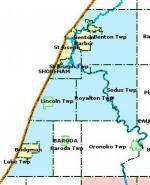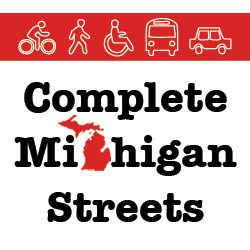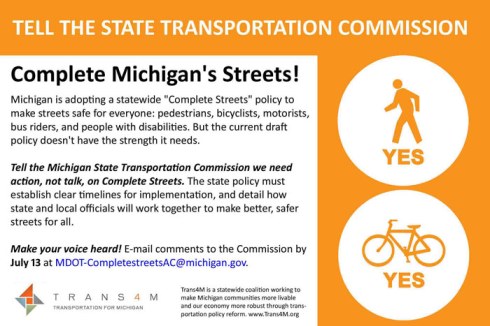You are currently browsing League of Michigan Bicyclists’s articles.
Complete Streets supporters in Southeast Oakland County have made significant advances in recent months, including the formal adoption of the Royal Oak Non-motorized Transportation Plan, a Complete Streets resolution for Oakland County, and most recently, the adoption of Complete Streets Guidelines by the Road Commission for Oakland County.
On December 12th, a community meeting is being organized by local bicycle advocates to discuss the the implementation of bicycle infrastructure such as marked bicycle routes, sharrows, bicycle boulevards, and road diets. A desired outcome of the meeting is to develop a strategy for a multi-city push for Complete Streets implementation that links the various Oakland County communities together with a safe and convenient bicycle and pedestrian network.
Meeting Details:
- Wednesday, December 12th, 2012 (12/12/12)
- 7:00 pm
- Royal Oak Public Library, 222 East 11 Mile Road, downtown Royal Oak
Residents and people who walk and bike through Berkley, Birmingham, Clawson, Ferndale, Huntington Woods, Oak Park, Royal Oak and Southfield are welcome and encouraged to attend. There is no need to register - just show up.
The meeting will also include three guest speakers:
- Todd Scott, Detroit Greenways coordinator for the Michigan Trails and Greenways Alliance. Mr. Scott has helped bring millions of dollars of grant funds into the Detroit area to fund bicycle infrastructure and is a nationally-known expert on mapping bicycle routes.
- Heather Carmona, Executive Director of the Woodward Avenue Action Association. Ms. Carmona was key in winning federal funding for the recent improvements to the Woodward-12 Mile intersection, is currently leading an 11-city effort to make Woodward Avenue a Complete Street from Detroit to Pontiac, and is helping to organize a Gran Fondo bicycle ride planned for next year.
- Tom Dusky, Green Cruise coordinator for the Southeast Michigan Sierra Club. The Green Cruise is a celebration of non-motorized transportation held annually in Ferndale.
The meeting is sponsored by the Royal Oak Environmental Advisory Board, Huntington Woods Environmental Committee, Berkley Environmental Advisory Committee, Woodward Avenue Action Association, and the Michigan Trails and Greenways Alliance.
For more information, contact:
Tom Regan - 248-797-1075
 The Road Commission for Oakland County (RCOC) Board of Road Commissioners, at its regular meeting today (Thursday, Sept. 27), accepted a set of Complete Streets guidelines intended to steer the agency in its efforts to apply complete streets concepts to county roads.
The Road Commission for Oakland County (RCOC) Board of Road Commissioners, at its regular meeting today (Thursday, Sept. 27), accepted a set of Complete Streets guidelines intended to steer the agency in its efforts to apply complete streets concepts to county roads.
The guidelines were compiled by the RCOC Complete Streets Review Committee, which, in addition to RCOC staff, included a number of county and local officials, transportation experts and others. The committee created the guidelines over the last 15 months.
“We strongly support the concept of complete streets and the idea that public roads should be as safe and accessible as possible for all legal users,” stated ROCC Chairman Eric Wilson. “These guidelines represent our commitment to that philosophy.”
The guidelines were adopted unanimously by the three-member RCOC Board. Board Member Ron Fowkes served on the Complete Streets Review Committee.
“This was a very constructive process,” Fowkes said of the committee’s work. “The committee included a broad spectrum of opinions related to complete streets, and that diversity of opinion is reflected in the guidelines. This document will guide this agency’s approach to all road users as we move forward.”
The guidelines also acknowledge that the agency must operate with the resources available. “We are wholly committed to complete streets and to all road users,” stated RCOC Managing Director Dennis Kolar. “But, we also acknowledge that resources are scarce, and that we have to balance the needs of various user groups.”
He added that the process of creating the Complete Streets Guidelines has reinforced for RCOC the critical importance of the agency’s partners in these efforts. “This process reminded us that we must work closely with all of our partners,” Kolar said, “especially the communities, and that this collaboration must come as early as possible in the road-project selection and design processes.”
The guidelines review the numerous groups of legal road users and their needs and discuss how they might be accommodated while acknowledging that Michigan is in the midst of a road-funding crisis that makes it hard for road agencies to merely maintain the existing road system. The guidelines sum up this challenge as follows: “Complete streets implementation, as a component of an improved, well-functioning transportation system, has entered the depleted scene of transportation financing, where it must compete for limited funding. State and local leaders are challenged to think in new ways about how to plan and fund the infrastructure that will provide for the future economic growth of the area.”
Download the RCOC Complete Streets Guidelines (PDF)
 The City of Birmingham is in the initial stages of preparing a multi-modal transportation plan for the City. The plan will help to improve the balance between all modes of transportation, with the goal of making foot, bike and transit travel easier and safer. To help guide the project, a survey has been prepared that will be used to help identify travel patterns, preferred types of improvements and desired project outcomes. The survey takes approximately ten to fifteen minutes to complete. You do not have to be a resident of Birmingham to take the survey. People who work and recreate in the City are also encouraged to provide input. To access the survey please click on the following web link:
The City of Birmingham is in the initial stages of preparing a multi-modal transportation plan for the City. The plan will help to improve the balance between all modes of transportation, with the goal of making foot, bike and transit travel easier and safer. To help guide the project, a survey has been prepared that will be used to help identify travel patterns, preferred types of improvements and desired project outcomes. The survey takes approximately ten to fifteen minutes to complete. You do not have to be a resident of Birmingham to take the survey. People who work and recreate in the City are also encouraged to provide input. To access the survey please click on the following web link:
https://www.surveymonkey.com/s/BirminghamMMTP
Alternatively, paper versions of the survey may be obtained from at the City Clerk’s office (located on the first floor) and the Planning Department (located on the second floor) at City Hall or the Baldwin Public Library. Completed paper surveys may be returned to the same locations or faxed to 734-668-8820 .
The web survey will close Sunday, November 4th at 11:00 p.m.
The results of the survey will be posted on the project webpage and be presented to the City Commission on November 12th.
Future public input opportunities for the project include: a Visioning Workshop on Thursday, January 17th from 7:00 to 9:00 p.m., and two Preliminary Plan Open House sessions on Thursday, February 28th from 3:00 to 5:00 and 7:00 to 9:00 p.m. The Visioning Workshop and the Preliminary Plan Open Houses will be held at the Baldwin Public Library.
For more information on the project please contact:
Susanna Weckerle
Assistant City Planner
Birmingham, Michigan
(248) 530-1846
[email protected]
Or visit the project webpage at http://greenwaycollab.com/Projects/Birmingham/BMMTP.html
Your time and insights are most appreciated.
After the State Transportation Commission officially adopted a Complete Streets policy on July 26th, 2012, as required by PA 134 and PA 135 of 2010, the Michigan Department of Transportation wasted no time in getting the word out about the good news. Upon request from the Michigan Complete Streets Advisory Council, MDOT recently published this one-page leave behind regarding the new policy in an effort to help inform internal staff, as well as road commissions, municipalities, and other interest groups across the state.
The one-pager includes the following vision for Complete Streets in Michigan:
- A transportation network that is accessible, interconnected and multimodal and that safely and efficiently moves goods and people of all ages and abilities throughout the State of Michigan.
- A process that empowers partnerships to routinely plan, fund, design, construct, maintain and operate complete streets that respect context and community values.
- Outcomes that will improve economic prosperity, equity, accessibility, safety and environmental quality.
Download the one-pager or preview it below.
 The Twin Cities Area Transportation Study, the group of communities in the Benton Harbor/St. Joseph area that work with federal, state, and local jurisdictions to plan for the transportation system in the area, recently passed their very own Complete Streets Policy! You can review the policy at http://www.swmpc.org/walkbiketwincats.asp.
The Twin Cities Area Transportation Study, the group of communities in the Benton Harbor/St. Joseph area that work with federal, state, and local jurisdictions to plan for the transportation system in the area, recently passed their very own Complete Streets Policy! You can review the policy at http://www.swmpc.org/walkbiketwincats.asp.
The policy aims to include non-motorized facilities in the development of all transportation projects within the planning jurisdiction. The design of our communities have not always taken into consideration other users of the transportation network, this policy aims to change the culture and infrastructure of an evolving region and demographic. This policy was developed with help from local municipalities, county road commission, MDOT, Disability Network of Southwest Michigan, and local advocacy groups representing biking, transit, and walking coalitions.
The next phase of the TwinCATS Walk and Roll Committee will be to develop a Top 10 list of locations in the planning area that need non-motorized facilities.
For more information about the TwinCATS Walk and Roll Committee or the process that was used to develop the policy contact Suzann Flowers at [email protected] or (269) 925-1137 x 17.
Interested in making your neighborhood or community more conducive to walking? The Michigan Department of Transportation (MDOT) is promoting a series of “walkability” audits in seven communities around the state, designed to provide a hands-on evaluation of the walking conditions in a portion of the community, and a discussion of design improvement ideas.
The walkability audits are designed to help city engineers, planners, officials, residents and others realize the benefits of providing a safe and attractive environment for walking. The free audits will be conducted by Dan Burden of the Walkable and Livable Communities Institute, who has 40 years of experience in developing, promoting and evaluating active transportation facilities, traffic calming practices and sustainable community design.
Audits will be conducted from Aug. 12 to17. For more details, contact the community organizer.
The 2012 schedule follows:
Sunday, Aug. 12 - Paw Paw
[email protected]
Monday, Aug. 13 - Alpine Township
[email protected]
Monday, Aug. 13 - Wyoming
[email protected]
Tuesday, Aug. 14 - Meridian Township
[email protected]
Wednesday, Aug. 15 - Gaylord
[email protected]
Thursday, Aug. 16 - Trenton
[email protected]
Friday, Aug. 17 - Detroit
[email protected]
 Yesterday the State Transportation Commission (STC),a six-member board that establishes policy and plans for Michigan’s transportation department, formally adopted a Complete Streets policy. The policy will direct Michigan Department of Transportation planners to keep all users in mind – including bicyclists, transit riders, motorists and pedestrians of all ages and abilities.
Yesterday the State Transportation Commission (STC),a six-member board that establishes policy and plans for Michigan’s transportation department, formally adopted a Complete Streets policy. The policy will direct Michigan Department of Transportation planners to keep all users in mind – including bicyclists, transit riders, motorists and pedestrians of all ages and abilities.
The STC invited public comment on the draft Complete Streets policy released at its June 28 meeting in Sault Ste. Marie. Many citizens and bicycle and pedestrian advocates across the state took advantage of the public comment period to request that the policy include stronger, clearer and more specific language with firm timelines for implementation. This included a petition drive led by the League of Michigan Bicyclists (LMB), which collected nearly 2500 signatures in a single week.
We thank the STC for being so responsive to the requests made by concerned citizens. Added and/or modified language strengthened the final policy providing more clarity in a number of areas as outlined below. A big thanks also goes out to all of the Michigan Complete Streets advocates who took the time to comment on the draft policy - your voices were heard!
Public Act 135 of 2010 requires the STC to enact a Complete Streets policy by August 2012. The STC has worked closely with the governor-appointed 18-member Complete Streets Advisory Council on the draft policy. The group’s role, according to law, is to advise the STC, county road commissions and municipalities on Complete Streets policies. Council members represent road and transit agencies, state agencies, walking and biking organizations, and environmental, senior citizens and disabled persons groups.
Below is a analysis of the final policy comparing it to the major revisions requested by the LMB petition.
- Strengthen implementation language.
- Identify the procedures or guidelines that will be developed or revised. – Did not include.
- Include a timeframe by which implementing documents will be developed or revised. – Included, by December 31, 2013.
- State a commitment to continue programs to educate and train MDOT personnel and other stakeholders on complete streets implementation. – Included language about training/education.
- Include language about implementation accountability. – Included language with a bit more specificity on what MDOT will report annually to the STC, but nothing about who will be responsible for developing/revising procedures, etc.
- State a commitment to continuing to base facilities design and construction on existing laws, best practices, and guidance documents. – Included language about this.
- Strengthen exception language.
- Refer to the exceptions already outlined in PA 135. – Not specifically referenced.
- Include a timeframe by which an exception procedure document will be developed. – Included, by December 31, 2013
- Include language about developing and using performance measures. – Included language about what MDOT will report annually to the STC, which stated “any information/examples to gauge MDOT’s performance.” (Not exactly what we was requested.)
- Strengthen language to direct MDOT to work with local road agencies (change “may” to “shall”). – Language was strengthened; “MDOT shall work with local road agencies that are undertaking road or bridge projects with federal funds…”
- Amend language about the network approach to expand “non-motorized” users to include all users, including people with disabilities and transit users. – Language states “all users”
- Specify whether there will be a sunset on annual reports to the State Transportation Commission. – Not specified.
Read the final policy below or download a PDF here.
The Complete Streets Advisory Council will meet at 2 p.m., Thursday, July 26, at the Capitol Commons Center, 400 S. Pine St., in Lansing. The meeting is open to the public.
The 18-member council was appointed in accordance with Public Act 135 of 2010. The group’s role, according to law, is to advise the State Transportation Commission, county road commissions and municipalities on Complete Streets policies. The law also requires the State Transportation Commission to enact a Complete Streets policy by August 2012. A “complete street” refers to a roadway that provides appropriate access to all legal users, including motorists, bicyclists, pedestrians and those traveling by assistive devices, such as wheelchairs.
If you need special assistance to attend the July 26 meeting, please contact Debra Alfonso at 517-241-4819. The public also can submit comments in writing prior to the meeting to: Michelle Myers, Michigan Department of Transportation, Intermodal Policy Division, P.O. Box 30050, 425 W. Ottawa St., Lansing, MI 48909. Comments can be e-mailed to the [email protected] address.
Complete Streets Advisory Council members represent road and transit agencies, state agencies, walking and biking organizations, and environmental, senior citizens and disabled persons groups. More information is available online at: www.michigan.gov/completestreets
Michigan’s draft Complete Streets policy is out, and the Michigan State Transportation Commission (MSTC) is looking for your feedback. Through July 13th, we urge you to join other citizens around the state by signing the change.org petition asking MSTC to adopt a stronger policy.
MSTC, a six-member board that establishes the policy and plans for Michigan’s Department of Transportation (MDOT), recently released the draft policy for implementing Complete Streets on state roads. The Complete Streets policy will direct MDOT planners to design and maintain roadways that fit within the context of the community and keep all users in mind, including bicyclists, public transit riders, motorists, and pedestrians of all ages and abilities.
While the state’s effort is a big step in the right direction, bicycle, disability, transit, and pedestrian advocates around the state think the policy could be clearer, more specific, and include firm timelines for implementing Complete Streets procedures. Advocates analyzed the policy, comparing it to national best practices, and have identified a number of key areas where Michigan’s policy could be improved.
The draft policy is the result of Complete Streets legislation passed in 2010 with overwhelming support from Michigan Legislature and the public. The legislation requires that the state adopt a policy by August 2012. MSTC is only allowing two weeks for the public to review and comment on the policy and this period is quickly coming to a close on July 13th. That’s why we need you to ACT TODAY and sign the petition urging MSTC to make improvements to the policy before adopting it.
 Michigan officials need your input on a draft policy that could make streets in your community much safer.
Michigan officials need your input on a draft policy that could make streets in your community much safer.
It’s Michigan’s official Complete Streets policy, and through July 13, you can join other citizens around the state to send a clear message to the state:
Adopt a policy that is strong and that moves Michigan forward.
Last week, the Michigan State Transportation Commission, a six-member board that establishes the policy and plans for Michigan’s transportation department, released a draft policy for implementing Complete Streets on state roads. The Complete Streets policy will direct Michigan Department of Transportation (MDOT) planners to design and maintain roadways that fit within the context of the community and keep all users in mind, including bicyclists, public transit riders, motorists, and pedestrians of all ages and abilities.
While the state’s effort is a step in the right direction, most bicycle, disability, bus, and pedestrian advocates around the state think the policy could be clearer, more specific, and include firm timelines for implementing Complete Streets procedures.
Without clarity and timelines most feel that the policy could become just another document that sits on a shelf in Lansing.
Michiganders have made it clear. They want safe and convenient transportation choices. And they want better, safer, and more Complete Streets.
To make sure Michigan adopts a strong policy, here’s how you can get involved:
Read the 2-page DRAFT Complete Streets policy here.
Please send an email to the Michigan State Transportation Commission and tell them how you feel about roads in your local community.
Here’s the email address: [email protected]
In your note, please tell them that you want a complete streets policy that:
- Establishes clear internal timelines and specific procedures that the Department, must adopt;
- Commit to training Department staff and other stakeholders on Complete Streets implementation, and;
- Directs state officials to use best practices while working with local officials and stakeholders on best practices to make better, safer streets for all.
Spread the word on Facebook:
Please “like” and “share” Trans4M’s Facebook postcard. Include the caption:
Michigan is adopting a Complete Streets policy and we think it can be better. Tell the Michigan State Transportation Commission that we need a stronger Complete Streets policy! http://bit.ly/MU9HJv
Let’s move Michigan forward!
Please “like” and “share”
To learn more about Complete Streets in Michigan, check out the Michigan Complete Streets Coalition website: http://michigancompletestreets.com
Let’s move together to complete Michigan’s streets!















